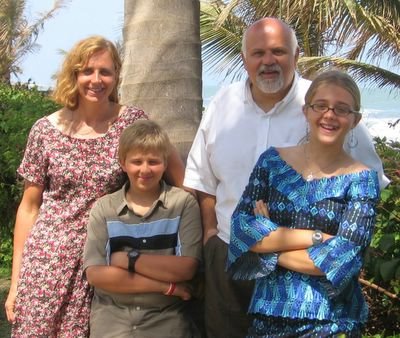
He was a Puerto Rican and proud of it, even though most folks thought he was African American. His laugh came from deep within and making him laugh felt so good I found myself saying crazy things just to get him going. A long time ago he lived in the mean streets of New York, and talked it, but settled down in suburbs of Grand Rapids, and I think endured it. As a pastor, he confused and vexed some of the very white, upper middle class members of his audience with a directness that cut through the crap of American Evangelicalism and made living with Christ gritty and in your face. As a counselor, he brought reality and hope to the broken and lost and searching. He loved God passionately, and reveled in every minute of life as if it was God’s very breath. He spoke with passion, taught with passion, complained (and sometimes swore) with passion, dispensed wisdom with passion, and with passion changed the hearts of thousands. Dante Venegas was as real as humans get.
A few years ago, he was diagnosed with cancer, and a few days ago, he died. During the last year he suffered enormous pain and refused to bow before it. His wife Jackie and family passed along updates regularly, and it was clear the man was embracing life even in midst of incredible agony. I could not visit him of course, but I wonder if he would have thought of himself as dying— it was as if he was living the reality of his cancer as he lived everything else—in our faces.
 In the mid nineties, Pope John Paul II issued a brilliant encyclical called “The Culture of Death,” in which he blasted the West for avoiding suffering even at the expense of life—God’s greatest gift. Suffering, John Paul said, was viewed by the West only as an evil, possessing no value. Abortion, euthanasia, drug abuse, escapism, and the American obsession with security and comfort, are all products of the Culture of Death. When John Paul died after a long and painful illness, he showed the world that life is greater than suffering, that suffering is an important part of living, and both ought to be lived fully. Dante Venegas did that too. He loved life, lived passionately, and I think he died passionately. He fought with life and he fought with suffering and in doing so, he showed us a better way.
In the mid nineties, Pope John Paul II issued a brilliant encyclical called “The Culture of Death,” in which he blasted the West for avoiding suffering even at the expense of life—God’s greatest gift. Suffering, John Paul said, was viewed by the West only as an evil, possessing no value. Abortion, euthanasia, drug abuse, escapism, and the American obsession with security and comfort, are all products of the Culture of Death. When John Paul died after a long and painful illness, he showed the world that life is greater than suffering, that suffering is an important part of living, and both ought to be lived fully. Dante Venegas did that too. He loved life, lived passionately, and I think he died passionately. He fought with life and he fought with suffering and in doing so, he showed us a better way.
Hold on now in your suffering, dear Jackie. You—and the rest of us who loved him-- will hear his laugh again soon.
A few years ago, he was diagnosed with cancer, and a few days ago, he died. During the last year he suffered enormous pain and refused to bow before it. His wife Jackie and family passed along updates regularly, and it was clear the man was embracing life even in midst of incredible agony. I could not visit him of course, but I wonder if he would have thought of himself as dying— it was as if he was living the reality of his cancer as he lived everything else—in our faces.
 In the mid nineties, Pope John Paul II issued a brilliant encyclical called “The Culture of Death,” in which he blasted the West for avoiding suffering even at the expense of life—God’s greatest gift. Suffering, John Paul said, was viewed by the West only as an evil, possessing no value. Abortion, euthanasia, drug abuse, escapism, and the American obsession with security and comfort, are all products of the Culture of Death. When John Paul died after a long and painful illness, he showed the world that life is greater than suffering, that suffering is an important part of living, and both ought to be lived fully. Dante Venegas did that too. He loved life, lived passionately, and I think he died passionately. He fought with life and he fought with suffering and in doing so, he showed us a better way.
In the mid nineties, Pope John Paul II issued a brilliant encyclical called “The Culture of Death,” in which he blasted the West for avoiding suffering even at the expense of life—God’s greatest gift. Suffering, John Paul said, was viewed by the West only as an evil, possessing no value. Abortion, euthanasia, drug abuse, escapism, and the American obsession with security and comfort, are all products of the Culture of Death. When John Paul died after a long and painful illness, he showed the world that life is greater than suffering, that suffering is an important part of living, and both ought to be lived fully. Dante Venegas did that too. He loved life, lived passionately, and I think he died passionately. He fought with life and he fought with suffering and in doing so, he showed us a better way.Hold on now in your suffering, dear Jackie. You—and the rest of us who loved him-- will hear his laugh again soon.

He is as wise and good and faithful as the setting African sun, and His promises as are as endless as the sky.

